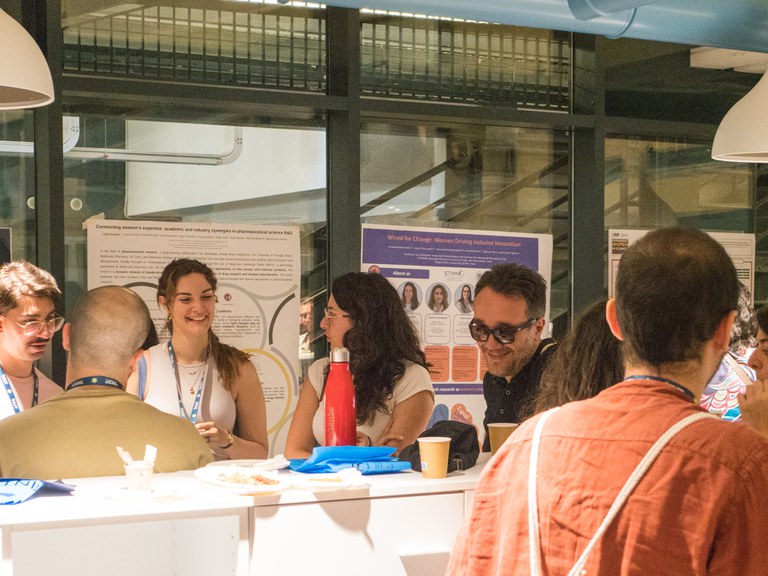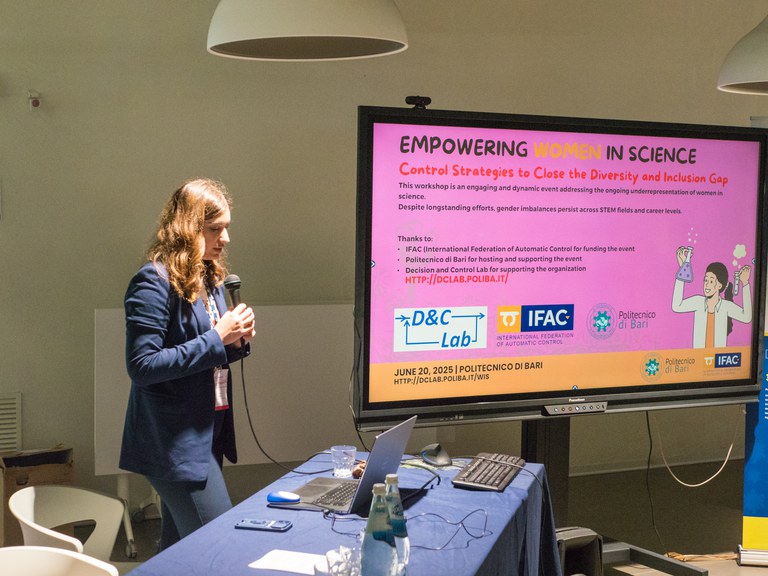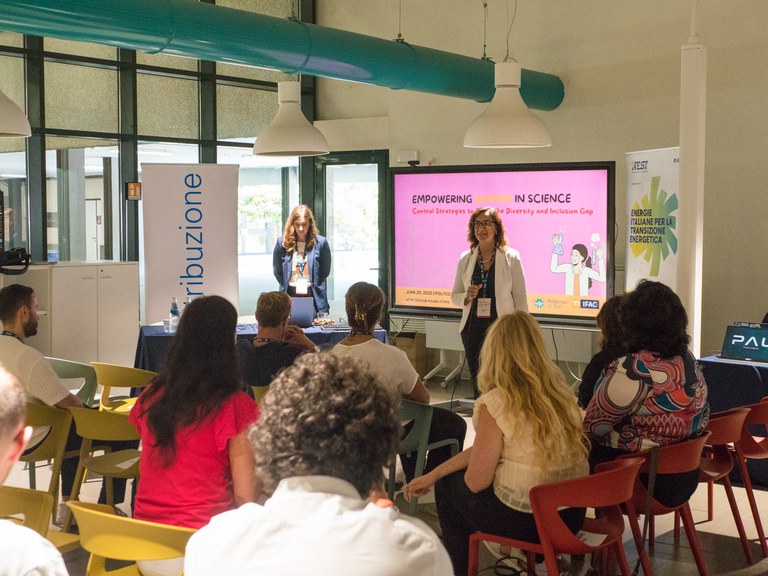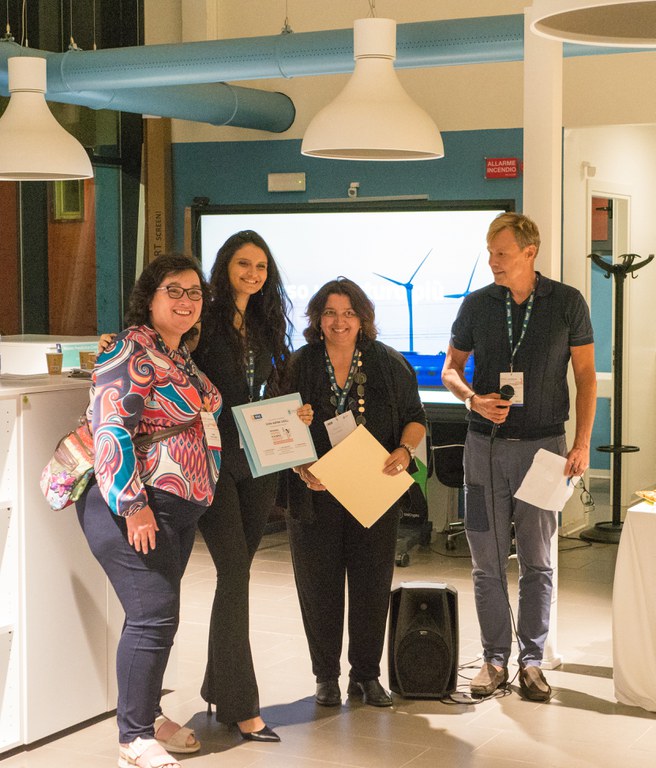Empowering Women in Science: Control Strategies to Close the Diversity and Inclusion Gap
Activity Organizer:
Silvia Proia, Università di Modena e Reggio Emilia, Italy; silvia.proia@unimore.it
IFAC Sponsor: Diversity and Inclusion Committee
Description:
The event entitled “Empowering Women in Science: Control Strategies to Close the Diversity and Inclusion Gap” was held at the Polytechnic University of Bari (Italy), on June 20, 2025, immediately following the IFAC Workshop on Smart Energy Systems for Efficient and Sustainable Smart Grids and Smart Cities (SENSYS 2025).
The event was structured into three key segments: an interactive workshop with keynote and invited talks, followed by an open discussion, a lively poster session alongside a launch, coffee break, and networking opportunities, and a closing Aperitif-and-Learn session. All sessions were conducted in person, enabling direct interaction among participants and speakers and fostering a collaborative atmosphere throughout the day.
The day began with an interactive workshop focused on inclusive communication, emphasizing the importance of language in shaping perceptions and fostering representation. Led by experts in diversity and gender studies, this session featured discussions designed to help participants adopt and internalize inclusive language practices.
This was followed by a rich sequence of keynote and invited talks, delivered by speakers from a wide range of disciplines—not only engineers and scientists, but also professionals from fields such as medicine and literature. This interdisciplinary approach enriched the conversation and underscored the importance of diversity and inclusion across all areas of society, not just within the STEM fields.
The keynote speakers were:
- Anna Castellano (Assistant Professor and President of the “Guarantee Committee for Equal Opportunities, Well-being, and Non-Discrimination at Work”, Polytechnic of Bari, Italy), Talk title: Women in the Academic World: Challenges and Opportunities
- Mary Doyle-Kent (Professor, Southeast Technological University, Ireland, and Chair of IFAC’s Diversity and Inclusion Executive Committee), Talk title: Why Optimizing Human Potential through Diversity, Equality, Belonging and Inclusion for Industry/Production 4.0, 5.0, and 6.0 is so Important in 2025
- Elisabetta Venezia (Professor, University of Bari Aldo Moro, Italy), Talk title: Gender-blind Transportation Research and Planning: Equity, Accessibility, and Sustainability Issues
- Sergio Angelastro (Software Development Area Coordinator, MAC&NIL S.r.l., Italy), Talk title: STEM Beyond Gender: It’s About Skills, Not Labels
A lively discussion with the audience followed, moderated by Silvia Proia (Postdoctoral Researcher, Università di Modena e Reggio Emilia, Italy), which encouraged open dialogue on the presented themes.
After a coffee break, the afternoon continued with further invited talks, which provided diverse insights from professionals in different fields, tackling issues of inclusion from both personal and professional perspectives:
- Monica Misceo (ENEA – Italian National Agency for New Technologies, Energy and Sustainable Economic Development, Italy), Talk title: The Energy Renovation as a Driver of Social Innovation
- Kenneth Carling (Full Professor and Head of Computing, Dalarna University, Sweden)
Talk: Daily Struggles Toward Science-Based Inclusion in My Computing Department - Maria Bavaro (Senior Head and Neck Surgeon, Dalarna Region Hospital, Sweden), Talk title: A Surgeon’s Reflections – Inclusion I Didn’t Know I Was Seeking
- Giulia Laddago (Ph.D. Candidate, University of Bari Aldo Moro, Italy), Talk title: “…Not to Segregate and Specialize, but to Combine”: Intersections of Gender Gap, Education and War in Virginia Woolf’s Three Guineas
A lively poster session ran in parallel with the presentations, showcasing ongoing projects, reflections, and research related to gender equality, inclusion strategies, and systemic challenges. This session offered a platform for younger researchers and professionals to share their perspectives and engage in dialogue. A committee of experts reviewed the posters, selecting the best two for recognition. The two top posters were awarded ex aequo for their outstanding contributions to the ongoing conversation about gender equality and inclusion in the sciences.
The day concluded with the Aperitif-and-Learn session, held in a relaxed early-evening setting paired with traditional Italian refreshments. This informal format created a collegial atmosphere that promoted honest and empathetic exchanges among attendees. The event wrapped up with a Poster Award Session and closing remarks delivered by Mariagrazia Dotoli (Full Professor, Politecnico di Bari, Italy).
Key Outcomes
- Increased Awareness: Participants gained a deeper understanding of the structural barriers faced by women and marginalized groups in science. Many left the event with concrete, actionable ideas to foster inclusion within their professional environments.
- Cross-Sector Collaboration: The event facilitated meaningful exchanges between academics, professionals, and students from diverse backgrounds and disciplines. These cross-sector collaborations are essential for tackling complex challenges related to diversity and inclusion.
- Community Engagement: The local academic and professional community played an active role in the event, reinforcing ongoing regional efforts toward diversity, equity, and inclusion.
- Actionable Takeaways: Participants left with a toolkit of strategies and frameworks for fostering inclusion, both within academia and industry, through policy changes, grassroots initiatives, and personal advocacy.
- Widespread Participation and Outreach: The event was a resounding success, bringing together more than 80 participants and featuring 33 posters from a broad spectrum of scientific fields. Owing to space limitations, the number of posters had to be capped, underscoring the strong interest and high quality of the submissions. The initiative also achieved significant outreach through online platforms, further amplifying the visibility and impact of the discussions beyond the physical venue.
Notes
The event closely followed the structure outlined in the original proposal. The following adjustments were applied to the Original Plan:
- Debate Replaced with Panel Discussions: The planned formal debate format was replaced by a panel discussion in response to participant feedback and to create a more inclusive, collaborative environment.
- Hackathon Segment Removed: Due to time constraints, the diversity hackathon was not held. However, interactive elements in the workshop and poster session ensured active engagement in problem-solving and idea generation.
Acknowledgments
We gratefully acknowledge the generous support of the International Federation of Automatic Control (IFAC) through its Activity Fund, which supports initiatives that promote inclusion and diversity within the global control community. We also thank the Polytechnic University of Bari for hosting the event and providing logistical support.
For more information, visit the event site: http://dclab.poliba.it/wis/

Participants engaging in discussions during the poster session.

Dr. Silvia Proia moderating the open discussion.

Dr. Silvia Proia (left) and Prof. Mariagrazia Dotoli (right) during the event’s closing session.

Poster Award Committee and Winner. From left to right: Prof. Mary Doyle-Kent, award winner Sonia Caselli, Prof. Elisabetta Venezia, and Prof. Kenneth Carling.

